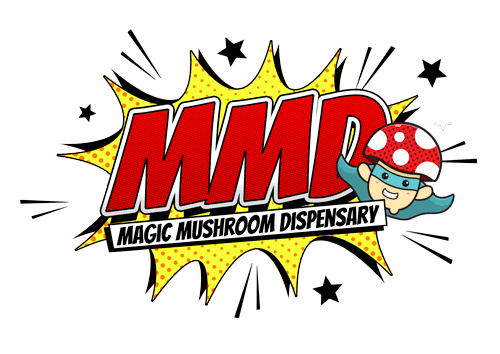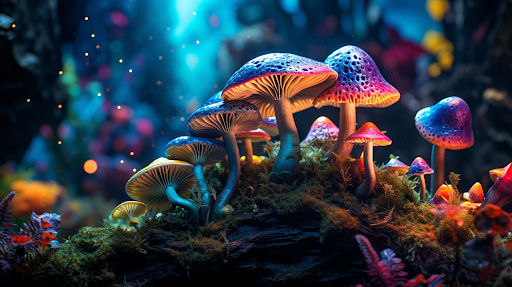Magic Mushrooms
Common Ground | Magic Mushrooms and Cannabis
In recent years, there has been a growing interest in the potential benefits of magic mushrooms and cannabis. These two distinct substances, each with a rich history and unique properties, share some commonalities when it comes to their effects and potential advantages. Are you curious about the intriguing similarities and potential benefits of magic mushrooms and cannabis? In this article, we delve into the history, effects, and potential benefits of magic mushrooms and cannabis.
The History and Origins of Magic Mushrooms and Cannabis
Magic Mushrooms (Psilocybin Mushrooms)
Magic mushrooms have been used for centuries in various cultures for their psychedelic properties. The use of hallucinogenic mushrooms dates back to prehistoric times, with evidence suggesting their consumption in rituals and spiritual practices among indigenous communities.
Cannabis
Cannabis, on the other hand, has a long history of use for both recreational and medicinal purposes. Ancient civilizations such as the Chinese, Egyptians, and Greeks recognized its therapeutic properties. Cannabis has been cultivated for thousands of years and has evolved into numerous strains, each with its unique chemical profile and effects.
Historical Similarities Between Magic Mushrooms and Cannabis
These substances have been used by various cultures throughout history for their psychoactive properties. Evidence suggests that both psilocybin mushrooms and cannabis were used in religious ceremonies and as medicinal treatments in ancient civilizations. Ancient texts, archaeological findings, and cultural practices provide insights into the historical use of these substances.
In recent times, there has been a renewed interest in studying the therapeutic potential of these drugs. Clinical trials and research articles have explored the use of psilocybin mushrooms for treating mental health conditions such as depression and anxiety. Cannabis has also gained recognition for its medical properties, with clinical trial protocols being developed to investigate its efficacy against various ailments.
The Effects and Potential Benefits of Magic Mushrooms and Cannabis
Magic mushrooms and cannabis are both classified as psychoactive substances, meaning they alter perception, mood, and consciousness when consumed. However, they achieve these effects through different mechanisms.
Psilocybin
Psilocybin, the active compound in magic mushrooms, primarily interacts with serotonin receptors in the brain. This interaction leads to altered sensory perception, mood enhancement, and even mystical or transcendental experiences. Clinical trials have shown promise in using psilocybin to treat conditions like depression, anxiety, and post-traumatic stress disorder (PTSD).
THC and CBD
Cannabis contains various compounds, with delta-9-tetrahydrocannabinol (THC) and cannabidiol (CBD) being the most well-known. THC is responsible for the psychoactive “high” associated with cannabis use, while CBD offers potential therapeutic benefits without the euphoric effects. Medical cannabis is used to alleviate symptoms of chronic pain, epilepsy, multiple sclerosis, and more.
Medical Treatment and Outcomes
Both magic mushrooms and cannabis have shown promise in medical treatment, albeit in different ways:
- Psilocybin has gained attention in clinical trials for its potential to treat conditions such as depression, anxiety, and post-traumatic stress disorder (PTSD). These studies use carefully controlled psilocybin doses to achieve positive mental health outcomes while minimizing the risk of negative experiences.
- Cannabis has been employed medically to alleviate symptoms of various conditions, including chronic pain, epilepsy, multiple sclerosis, and nausea associated with chemotherapy. The outcomes of cannabis users vary depending on the specific medical condition and the strain of cannabis used.
Different Strains and Varieties of Magic Mushrooms and Cannabis
Both magic mushroom species and cannabis come in various forms, each with its unique characteristics. These strains may have different levels of active compounds, resulting in distinct effects and potential medical benefits.
Psychedelic Mushroom Strains and Varieties
Magic mushrooms come in various strains and varieties, each distinguished by its unique combination of psychoactive compounds, effects, and appearance. Let’s explore some of the most well-known strains:
- Psilocybe cubensis: Often referred to as the “Golden Teacher”, the psilocybe cubensis mushroom is one of the most common and widely recognized strains. It’s renowned for its moderate potency and characteristic golden-brown cap with a white stem. This strain is often favored by beginners due to its relatively predictable effects.
- Psilocybe cyanescens: Also known as the “Wavy Cap” or “Pacific Northwest Magic Mushroom”. It is known for its wavy, caramel-colored caps and intense psychedelic experiences. Psilocybe cyanescens is highly potent and typically found in temperate regions.
- Psilocybe semilanceata: Commonly called the “Liberty Cap,” the Semilanceata is a small but potent mushroom found in various parts of the world. It is known for its distinctive conical cap and potent psychoactive effects.
Cannabis Strains and Varieties
Cannabis boasts a wide range of strains and varieties, each with its distinct chemical profiles, flavors, and effects. Here are some of the key cannabis strains:
- Indica: Indica strains are known for their relaxing and sedating effects. They often have higher levels of CBD and are associated with body relaxation, pain relief, and improved sleep. Popular indica strains include Northern Lights, Purple Kush, and Granddaddy Purple.
- Sativa: Sativa strains are more energizing and uplifting. They typically contain higher levels of THC and are associated with increased creativity, focus, and sociability. Well-known sativa strains include Sour Diesel, Jack Herer, and Durban Poison.
- Hybrid: Hybrid strains are a mix of indica and sativa genetics, offering a balance between relaxation and stimulation. Hybrid strains can be further categorized into indica-dominant, sativa-dominant, or balanced hybrids, depending on their genetic makeup. Examples include Blue Dream, Girl Scout Cookies, and OG Kush.
How to Safely and Responsibly Consume Magic Mushrooms and Cannabis
Consuming classical psychedelics responsibly is crucial to mitigate potential risks and maximize benefits. It’s essential to consider factors like dosage, set and setting, and individual tolerance. Health care professionals should always be consulted, especially in the case of pre-existing medical conditions.
These factors play a crucial role in ensuring a positive experience with minimal risks:
- Dosage: Start low and go slow. Individual outcomes of psilocybin users vary, so it’s essential to know your own limits.
- Setting: Choose a comfortable environment where you feel safe and relaxed. Avoid crowded places or unfamiliar surroundings that may induce anxiety or stress. Additionally, consider having a trusted friend or sitter present who can provide support if needed.
- Pre-existing medical conditions: Certain medical conditions and mental health disorders may increase the risk associated with consuming classic drugs. Individuals diagnosed with bipolar disorder, depressive disorder, or compulsive disorder should exercise caution when using magic mushrooms or weed due to their potential effects on mood regulation.
- Buying psychoactive substances from a trusted source: Obtaining magic mushrooms from reliable suppliers is crucial for ensuring product quality and safety. Health Canada’s strict regulations for those who cultivate psilocybin-containing fungi for medical purposes ensure the average psilocybin content is appropriate for patients.
The Science Behind the Psychoactive Compounds in Magic Mushrooms and Cannabis
Both magic mushrooms and cannabis are known for their psychoactive properties, but the mechanisms behind their effects on the human mind and body differ significantly. In this section, we delve into the science behind the psychoactive compounds found in these substances and how they produce their distinct effects.
Psychedelic Compounds in Magic Mushrooms
Magic mushrooms owe their mind-altering effects to the presence of the compound psilocybin and its metabolite, psilocin. When ingested, psilocybin is converted into psilocin in the body. These substances interact with the brain’s serotonin receptors, particularly the 5-HT2A receptor. This interaction results in profound alterations in perception, mood, and consciousness, contributing to the psychedelic experience.
Serotonin, often referred to as the “feel-good” neurotransmitter, plays a critical role in regulating mood, emotions, and cognitive functions. Psilocin’s interaction with serotonin receptors disrupts the typical serotonin pathways in the brain, leading to the characteristic psychedelic effects.
Psychoactive Compounds in Cannabis
Cannabis’s psychoactive effects are primarily attributed to the cannabinoid delta-9-tetrahydrocannabinol (THC). THC interacts with the endocannabinoid system in the brain, specifically binding to CB1 receptors. This interaction results in various psychological and physiological effects.
The effects of cannabis vary depending on the dosage of THC consumed. Lower doses may produce mild euphoria, relaxation, and altered sensory perception, while higher doses can lead to stronger psychoactive effects, including intense sensory experiences and altered thought patterns.
Exploring the Spiritual and Therapeutic Uses of Magic Mushrooms and Cannabis
The ancient traditions and contemporary research surrounding psychedelic drugs like magic mushrooms and cannabis have unveiled a realm of spiritual and therapeutic possibilities. Their profound psychedelic effects are increasingly being explored for their capacity to heal and enlighten.
Magic Mushrooms: A Gateway to the Psychedelic Realm
The therapeutic approach to magic mushrooms often involves more than just the psychedelic experience itself. When consumed, users experience a psilocybin journey that transcends ordinary consciousness, often leading to profound insights and experiences.
Research has demonstrated the potential of magic mushrooms in medical treatment for various mental health conditions, including depressive disorders. Clinical trials have shown that carefully administered doses of psilocybin, in conjunction with therapy, can lead to significant improvements in depressive symptoms, sometimes with long-term effects. The integration of experiences is a vital component, where individuals work with therapists or guides to process and make sense of their psychedelic journey.
Cannabis: A Herb with Healing Potential
Cannabis, while not a classic psychedelic like magic mushrooms, has a rich history of medical treatment and therapeutic use. Its diverse strains, containing varying levels of THC and CBD, offer a spectrum of effects, making it a versatile tool for managing various health conditions.
The growing body of scientific literature on cannabis underscores its potential as a therapeutic agent. Researchers are exploring its effectiveness in managing pain, reducing anxiety, alleviating symptoms of post-traumatic stress disorder, and more. For individuals struggling with conditions that affect appetite, such as cancer patients undergoing chemotherapy, cannabis can serve as an appetite stimulant. This can help maintain weight and improve overall quality of life during a challenging time.
Ensuring Safety and Long-Term Well-Being
Access to psilocybin has ushered in a new era of understanding, therapy, and personal growth. However, it is vital to be aware of the potential for negative effects and adverse experiences. Ensuring the safety of patients and considering potential long-term effects is paramount.
Safety Measures for Psychedelic Substances
Despite their promising therapeutic applications, psychedelic substances remain restricted drugs in many jurisdictions due to concerns about misuse and the potential for adverse effects. In recent years, there has been a resurgence of interest in utilizing psychedelics, such as those found in Psilocybe cubensis, in clinical settings.
Hospitals and health authorities have become increasingly open to exploring the therapeutic potential of these substances for conditions like depression, anxiety, and PTSD. The concern for drug and patient safety is a top priority in any clinical or therapeutic context involving psychedelics. Rigorous screening, psychological assessments, and health authority oversight are essential to minimize risks.
Start Your Psilocybin Journey from the Comfort of Your Home
Discover a world of natural wonders with our premium online magic mushroom delivery service. Magic Mushroom Dispensary offers a wide range of top-quality psilocybin mushrooms, discreetly delivered to your doorstep. You can explore our diverse selection of high-quality products, each carefully curated to deliver a wide range of subjective effects. With easy online ordering and a commitment to quality, we’re your trusted source for unlocking the potential of cannabis and psilocybin mushrooms.
Frequently Asked Questions
There is no known lethal dose of psilocybin. This chemical compound is generally considered to have a low toxicity profile, and there have been very few reported cases of fatal overdoses attributed to psilocybin-containing mushrooms.
Individuals with certain mental health conditions such as bipolar disorder and borderline personality disorder are more susceptible to having negative experiences with hallucinogenic mushrooms. However, research is currently underway to find psilocybin-based treatments for these conditions.
Some studies suggest that the use of psilocybin-containing mushrooms may lead to temporary increases in heart rate and blood pressure during the acute effects of the trip, while others do not find significant cardiovascular effects. However, these changes are generally considered mild and not typically associated with significant health risks in healthy individuals.

